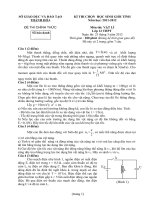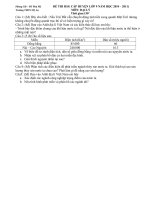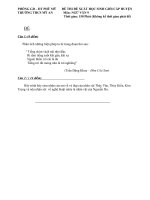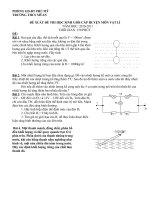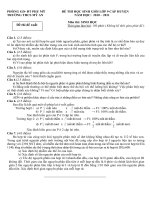Đề và đáp án thi học sinh giỏi môn tiếng anh lớp 7
Bạn đang xem bản rút gọn của tài liệu. Xem và tải ngay bản đầy đủ của tài liệu tại đây (29.72 KB, 3 trang )
§Ò «n luyÖn häc sinh giái khèi 7 sè2
Subject - Verb Agreement
I. Choose the correct form of the verb in parentheses in the following sentences.
1. John, along with twenty friends, ( is/ are ) planning a party.
2. The picture of the soldiers ( bring / brings ) back many memories.
3. The quality of these recording ( is / are ) not very good.
4. If the duties of these officers ( isn't / aren't ) reduced, there will not be enough time to finish
the project.
5. The effects of cigarette smoking ( have/ has ) been proven to be extremely harmful.
6. The use of credit cards in place of cash ( have / has ) increased rapidly in recent years.
7. Advertisements on television ( is / are ) becoming more competitive than ever before.
8.Living expenses in these country, as well as in many others, ( is/are ) at an all-time high.
9. Mr. John , accompanied by several members of the committee, ( have/has ) proposed some
changes of rules.
10. the levels of intoxication ( vary/varies ) from subject to subject.
11. Neither Bill nor Mary ( is /are ) going to the play tonight.
12. Anything ( is/are ) better than going to an other movies tonight.
13. Skating ( is /are ) becoming more popular everyday.
14. A number of reporters ( was/ were ) at the conference.
15. Everybody who ( has/ have ) a fewer must go home immediately.
16. Your glasses ( was/were ) on the bureau last night.
17. These ( was/ were ) some people at the meeting last night.
18. The committee ( has/have ) already reached a decision.
19. A pair of jeans ( was/were ) in the washing machine this morning.
20. Each student ( has/have ) answered the first three questions .
21. Either John or his wife ( make/ makes ) breakfast each morning.
22. After she had perused the material, the secretary decided that everything ( was/were ) in
order.
23. The crowd at the basketball game ( was/ were ) wild excitement.
24. A pack of wild dogs ( has/ have ) frightened all the ducks away.
25. The jury ( is/are ) trying to reach a decision.
26. The army ( has/ have ) eliminated this section of the training test.
27. The number of students who have withdrawn from class this quarter ( is / are ) appalling.
28. There ( has/ have ) been to many interruptions in this class.
29. Every elementary school teacher ( has/ have ) to take this examination.
30. Neither Jill nor her parents ( has/ have ) seen this movies before.
II/ Put the right word into these sentences
1. Bill is than John . A. tall B. taller C. tallest
2. He is not this morning. A.hungry B. hungrier C. hungriest
3. Jack is a footballer than Henry A. good B.better C.best
4. He has bought a very car. A. fastest B. fast C. faster
5. He is than Mr. Brown. A. fat B fatter C. fattest
6. Lesson 1 is than lesson 2 A. easy B. easier C. easiest
7. This is the lesson in the book A. hard B. harder C. hardest
8. Mary is a girl, but Susan is .
A.pretty/ pretty A. pretty/ prettier C. prettier/ prettiest
III/ Supply the correct verb tense:
1. What you (do) next week?
- It depends on the weather. If it's fine we(go) somewhere. If it is wet, we probably
(stay) at home.
2. -You(get) a glass of lemon juice for me?
_ All right. Here you are.
3. How often you(have) (see) the doctor?
4. They'll have to stay in bed if they (not feel) better tomorrow.
5. Don't forget to take an umbrella. It (rain)
6. You want me( make) you some coffee, don't you?
7. -I'm afraid she's not quite ready.
- Never mind. We(wait).
II. Choose the best answer.
1. Tom with his dog here now.
A. is B. are C. was D. were
2. Tom as well as his dog here now .
A. is B. are C. was D. were
3. My old friend and colleague, John, married.
A. has just got B. have just got C. just has got D just have got
4. The singer as well as actor coming now.
A. was B. were C. is D. are
5. 4. The singer and actor coming now.
A. was B. were C. is D. are
6. Mathematics difficult.
A. was B. were C. is D. are
7. Two billion dollars not enough for the victims of the Tsunami.
A. was B. were C. is D. are
8. Three years in a strange land like a long time for lonely people.
A. is seeing B. are seeing C. seems D. seemed
9. The film Titanic very interesting.
A. A. was B. were C. is D. are
10. Cattle allowed to graze here now.
A. was B. were C. is D. are
11. None of his money mine now.
A. was B. were C. is D. are
12. Every student willing to join the picnic now.
A. was B. were C. is D. are
13. If anyone , tell him I' be back later.
A. was calling B. called C. call D. calls
14. Each of the boys a book now.
A. have B. has C. had D. are having
15. Two thirds of the money mine .
A. was B. were C. is D. are
16. About 60% of students in this class from China.
A. was B. were C. is D. are
17. A number of sheep eating grass now.
A. was B. were C. is D. are
18. A number of books in this library large.
A. was B. were C. is D. are
19. Either you or I wrong.
A. am B. were C. is D. are
20. Neither my gloves nor my hat with this dress.
A. is going B. go C. goes D. are going
21. The poor living here help.
A. is needing B. are needing C. need D. needs
22. Several of the students absent yesterday.
A. was B. were C. had been D. has been
III. Choose the best answer.
1. Don't depend on him, he is a very person.
A. reliable B. unreliable C. relying D. relied
2. Don't be so , we are only been waiting a few minutes.
A. patient B. patience C. impatient D. impatience
3. 7.30 A.M on Saturday is a rather time for an appointment.
A. inconvenient B. convenient C. inconvenience D. convenience
4. Sorry about the mistake, I the instructions you gave me.
A. mistaken B. understood C. misunderstood D. misunderstanding
5. They've my name on this form- the first letter is L not R.
A. misspelt B. spelt C. spelling D. misspelling
6. After I had got to know him better, I him intensely.
A. unlike B. dislike C. unlikely D. unliking
7. He said the government would do its best to the problem of unemployment.
A. device B. answer C. solve D. relax
IV. Put each the verb in brackets into a suitable tense.
1. What can we do to get in touch with Robert? If only we ( know ) his phone number.
2. Come on children ! It is time you ( be ) in bed.
3. Actually I'd rather you ( not / smoke ) in here.
4. Suppose you ( see ) a ghost. What would you do ?
5. I'm so annoyed about my car accident. If only ( be ) more careful!
6. It's high time you ( start ) working more seriously.
7. I'd rather you ( not / put ) your coffee on top my book.
8. I have no idea where we are! If only we ( have ) a map.
9. Your hair is rather long. Don' you think it is time you ( have ) a hair cut?
10.Visiting museums is interesting I suppose, but sooner we ( go ) swimming.
V. What teenagers do with their money.
Thirteen - year-olds do not spend as much money as their parents suspect- at least not according
to the findings of a(1) survey, Money and change. The survey (2) three hundred
teenagers, 13- 17 years old, from(3) Britain.
By the time they(4) their teens, most children see their weekly allowance rise
dramatically to an amazing national average of $ 5.14. Two thirds think they get
(5) money, but most expect to have to do something to get it.
Although they have more cash, worry about debt is (6) among teenagers. Therefore, the
(7) of children (8) an effort to save for the future. Greater access to cash
(9) teenagers does not, however, mean that they are more irresponsible(10) a
result. The economic recession seems to have encouraged(11) attitudes to money, even
in the case of children at these ages. Instead of wasting what pocket(12) they have on
sweets or magazines, the 13- year- olds who took(13) in the survey seem to(14)
to the situation by saving more than half(15) their cash.
1. A. late B. recent C. latest D. fresh
2. A. included B. contain C. counted D. enclosed
3. A. entire B. all over C. complete D. the whole
4. A. reach B. get C. make D. arrive
5. A acceptable B. adequate C. satisfactory D. enough
6. A. gaining B. heightening C. increasing D. building
7. A. most B. maximum C. many D. majority
8. A. make B. do C. have D. try
9. A. among B. through C. between D. along
10. A. like B. as C. for D. in
11. A. aware B. knowing C. helpful D. cautious
12. A. cash B. money C. change D. saving
13. A. part B. place C. share D. piece
14. A. reply B. answer C. response D. return
15. A. from B. as C. of D. for
The end




